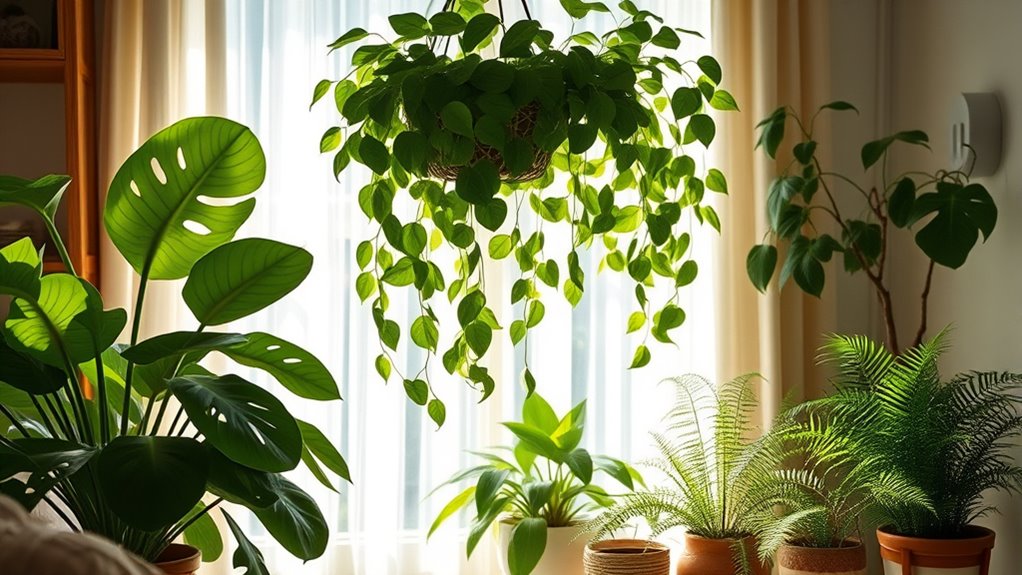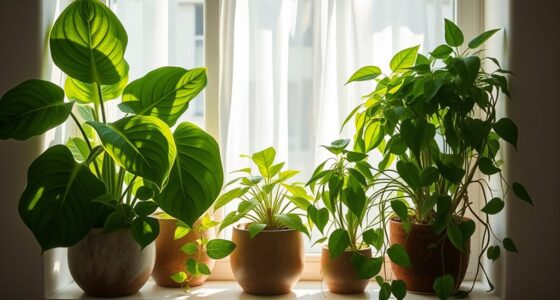Houseplants can markedly boost your happiness by improving your mood, reducing stress, and sharpening focus. They create a calming environment, helping you feel more relaxed and emotionally balanced. Caring for your plants also gives you a sense of purpose and achievement, boosting your confidence. Adding greenery to your space not only beautifies it but also promotes mental well-being. If you want to learn how to maximize these benefits, keep exploring how indoor plants can transform your mood.
Key Takeaways
- Indoor greenery enhances mood and well-being by creating calming, inviting environments that promote relaxation.
- Caring for houseplants reduces stress and anxiety, fostering mindfulness and emotional fulfillment.
- Houseplants improve cognitive functions like focus, memory, and problem-solving through natural visual stimulation.
- Nurturing indoor plants provides a sense of purpose and achievement, strengthening emotional resilience.
- An indoor garden tailored to space and care routines boosts happiness by promoting a thriving, soothing environment.
The Psychological Benefits of Greenery in the Home
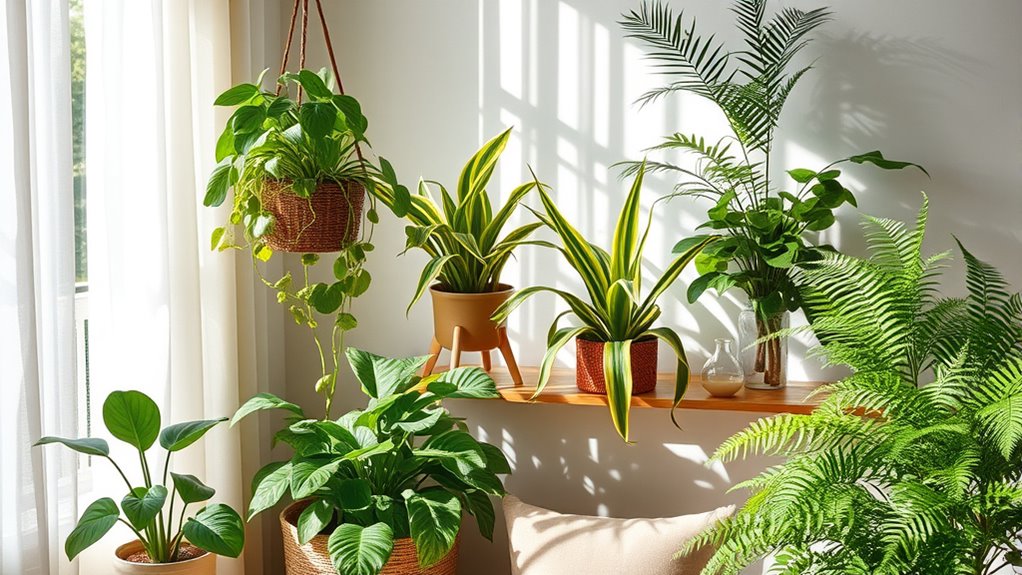
Having greenery in your home can remarkably boost your mood and overall well-being. Plant aesthetics create a soothing environment, making your space feel more inviting and lively. The visual appeal of lush, vibrant plants can lift your spirits and foster a sense of calm. Additionally, many houseplants serve as natural air purification systems, filtering out toxins and improving indoor air quality. This not only makes your environment healthier but also contributes to a sense of freshness and clarity. When you incorporate greenery into your living space, you’re actively enhancing your mental state by connecting with nature. The combination of attractive plant aesthetics and the benefits of natural air purification supports a more positive, relaxed mindset every day. Understanding color accuracy and proper lighting can further enhance the visual appeal of your indoor plants, making them even more vibrant and inviting.
How Houseplants Influence Stress and Anxiety Levels
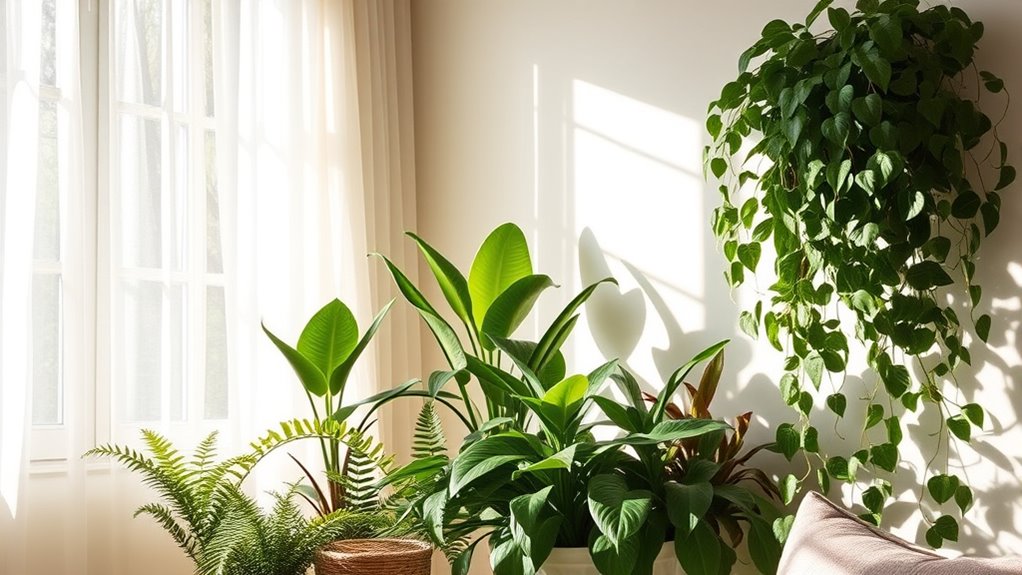
Houseplants can considerably reduce stress and anxiety by creating a calming environment you can easily incorporate into your daily routine. Engaging in plant therapy allows you to focus on nurturing greenery, which promotes stress reduction. The presence of indoor plants can lower cortisol levels and improve your mood. Visualize a cozy corner with a lush fern beside a gentle lamp, or a vibrant pothos hanging in sunlight. This imagery can help you picture how indoor greenery transforms your space into a sanctuary. Here’s a quick mental image:
| Calm Space | Greenery in Action |
|---|---|
| Soft lighting | Vibrant, healthy leaves |
| Cozy corner | Gentle plant movement |
| Quiet moment | Fresh, earthy scent |
| Relaxing ambiance | Natural stress relief |
| Peaceful environment | Mindful care routine |
Incorporate houseplants for natural stress reduction today, and remember that engaging with plants can also support your personal development journey by fostering mindfulness and emotional well-being self-reflection.
The Connection Between Indoor Plants and Cognitive Function
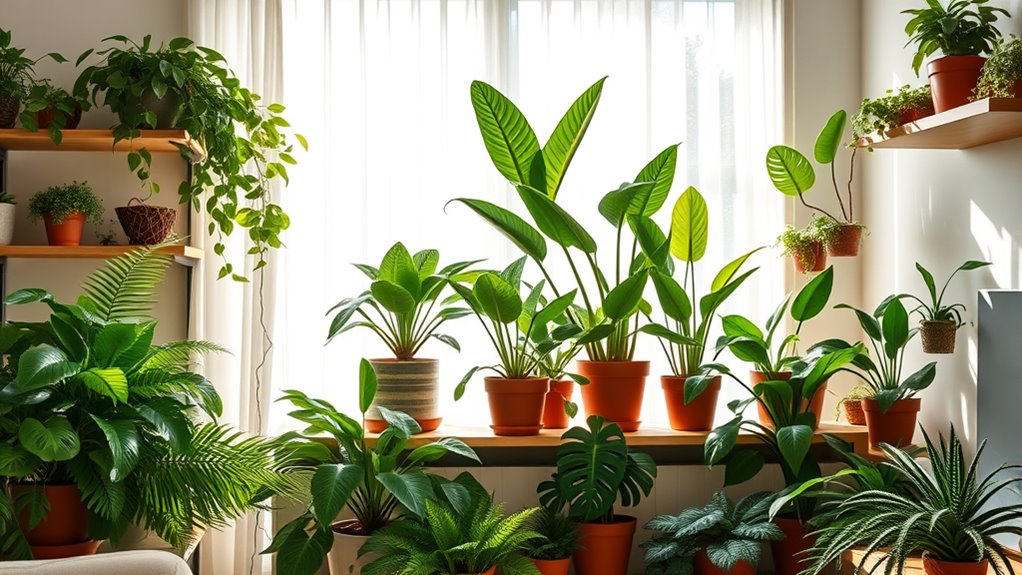
Research shows that indoor plants can markedly boost your cognitive function, helping you think more clearly and focus better. When you surround yourself with green environments, your plant cognition improves, making tasks feel easier and more engaging. Studies suggest that exposure to greenery enhances memory, attention span, and problem-solving skills. The presence of indoor plants reduces mental fatigue by creating a calming atmosphere, which allows your brain to process information more efficiently. The natural elements in your environment stimulate your neural pathways, encouraging better concentration and mental clarity. Incorporating indoor greenery into your space isn’t just about aesthetics; it’s a smart way to optimize your mental performance and stay sharp throughout the day. Green environments truly support your cognitive health. Additionally, the mental health benefits of having indoor plants extend beyond cognition, promoting overall emotional well-being.
Emotional Well-Being and the Sense of Accomplishment Through Plant Care

Taking care of indoor plants not only enhances your environment but also boosts your emotional well-being. Engaging in plant nurturing provides a sense of purpose and daily achievement, which can notably improve your mood. Watching your plants grow and thrive offers tangible proof of your effort, fostering emotional fulfillment. The routine of watering, pruning, and caring for your greenery creates a calming rhythm that reduces stress and anxiety. As you observe positive changes, you experience a sense of accomplishment that elevates your overall happiness. This connection between caring for your plants and feeling emotionally rewarded strengthens your bond with your indoor greenery, making it more than just decoration—it becomes a source of personal growth and emotional resilience. Incorporating paint sprayer maintenance into your routine can also improve your gardening experience by ensuring your tools stay in top condition.
Practical Tips for Creating a Happiness-Boosting Indoor Garden
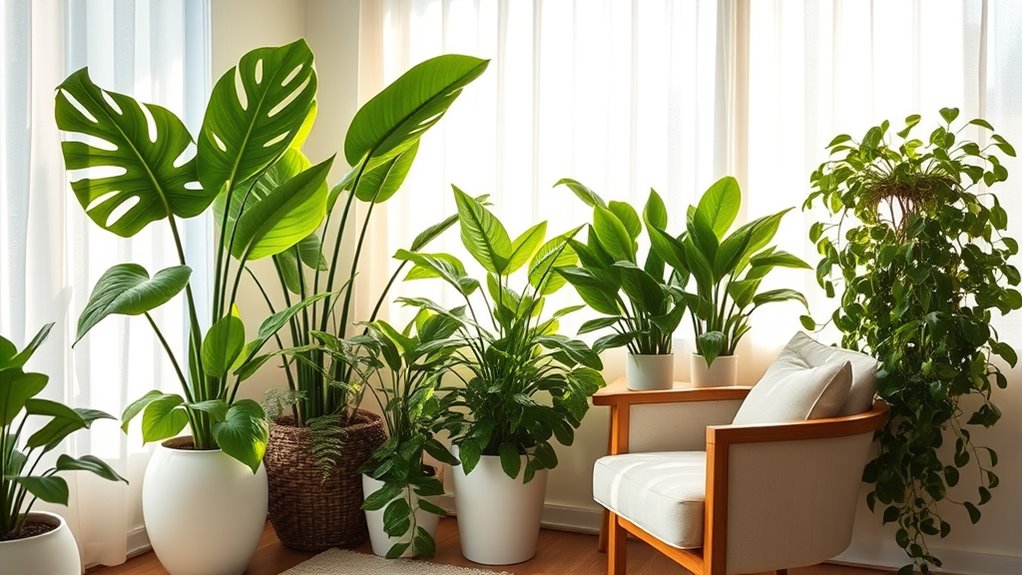
Creating a happiness-boosting indoor garden starts with choosing the right plants for your space and lifestyle. Focus on plant placement to guarantee each plant gets the light it needs, whether near a window or in a shaded corner. Consistent watering routines are key; overwatering can harm plants, while underwatering stresses them. Establish a schedule that fits your routine, like watering once a week or when the topsoil feels dry. Use the table below to match plant types with ideal placement and watering needs:
| Plant Type | Placement | Watering Routine |
|---|---|---|
| Fiddle Leaf Fig | Bright, indirect light | Weekly, when soil dries out |
| Snake Plant | Low to bright light | Every 2-3 weeks |
| Pothos | Low to medium light | Every 1-2 weeks |
This approach helps create a thriving, happiness-boosting indoor garden.
Frequently Asked Questions
Can Houseplants Improve Sleep Quality in Indoor Environments?
You might wonder if houseplants can improve your sleep quality. They can, in part, because plants increase humidity levels, creating a more comfortable environment. Proper soil composition helps plants stay healthy and effectively filter indoor air, reducing pollutants and allergens. When your indoor space has balanced humidity and healthy plants, you may find it easier to relax and fall asleep, enjoying better sleep quality naturally.
Are Certain Plant Species More Effective at Boosting Mood Than Others?
Sure, some plant species seem to have a magic touch for boosting your mood—like a leafy placebo. You might find that snake plants or peace lilies offer better mood enhancement than ferns or succulents. While some plants may seem more effective, it’s really about what makes you feel good. So, experiment with different plant species, and let your mood be your guide—nature’s own mood ring.
How Do Indoor Plants Affect Air Quality and Respiratory Health?
Indoor plants can improve air quality through natural air purification, removing toxins and increasing oxygen levels. This enhances respiratory health by reducing pollutants that may cause or worsen breathing issues. When you include plants like spider plants or snake plants, you benefit from their ability to filter airborne chemicals, providing respiratory benefits. As a result, your indoor environment becomes healthier, making it easier to breathe and potentially reducing allergy symptoms.
What Are the Best Lighting Conditions for Maximizing Plant Happiness?
Remember, a little sunlight goes a long way. For your plants to thrive, make sure they get the right light intensity—bright, indirect sunlight works for most. Keep light duration consistent, ideally around 12-16 hours a day, to mimic natural conditions. Adjust based on your plant’s needs; some prefer more light, others less. Proper lighting not only keeps your plants happy but also boosts their growth and overall health.
Can Plant Care Routines Help Reduce Feelings of Loneliness?
You might find that establishing a regular plant care routine can boost your sense of social connection and routine stability, helping reduce feelings of loneliness. Taking time to water, prune, or repot your plants creates a purposeful activity that encourages mindfulness. Sharing your plant care experiences with friends or online communities fosters social bonds. Over time, these routines can provide comfort and a sense of belonging, easing feelings of loneliness.
Conclusion
Bringing houseplants into your home boosts your mood, boosts your focus, and boosts your sense of achievement. It reduces your stress, enhances your emotional well-being, and enriches your daily life. With every leaf you nurture, you create a sanctuary of calm and happiness. So, choose your plants, care for them with love, and watch your environment—and your happiness—thrive. Because when you surround yourself with greenery, you invite joy, peace, and growth into every corner of your life.
